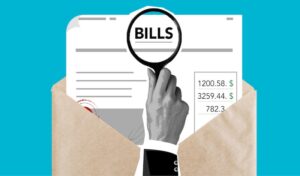10 Strategies to Avoid Taking on More Debt

This post may contain affiliate links. If you use these links to buy something we may earn a commission but you may gain some knowledge.”
No one tries to get in to debt, it is one of those things that happens out of necessity or impatience. If you start to feel like your debt is getting out of control or you are gaining debt without you noticing, it is time to reevaluate your financial situation.
It may begin to feel like you don’t have any control, but staying out of debt is possible and following these 10 Strategies will help you along the way.
- If you can’t afford it with a credit card and pay it off at the end of the month, don’t buy it. For many, this is unfortunately a realization that comes too late. Many people have an illusion that once they get a credit card, they can now afford things they couldn’t before. Live by this rule and you will be fine, if you can’t afford it with cash, then you can’t afford it with a card.
- Have an Emergency Fund. Sadly, most Americans today can’t afford a $500 emergency expense. Their plan is to put it on the card. Wouldn’t it be nice to know that after an emergency or unfortunate event like your car breaking down or losing your job you wouldn’t be reminded of it every month afterwards when it comes to paying your credit card bill that you can’t afford. This is where having an emergency fund is beneficial. It is recommended that you have at least 6 months of your salary in your emergency fund.
- Pay off your credit card every month. One of the best ways to keep your spending in check is to pay off your credit card every month. If you make a large purchase with your credit card, for rewards reasons, pay it off the next day while it’s fresh in your mind and so you don’t forget about it by the end of the month or something else comes up and you don’t have the money to pay it off.
- Focus on your needs. There is always room in your budget to adjust for savings. Depending on your income, it may be harder for you than it is for others. Cutting out your wants is not always easy. This may include your weekly night out with friends, or that $8 coffee you love so much every morning. Making these types of decisions can be painful, but if you are truly committed to improving your financial situation they will be easier.
- Create a budget, and stick to it. By writing out all of your expenses and tracking them, you will have a better understanding of where your money is going and help you cut out your wants to leave money left over to meet your goals. Develop a plan for your money because if you don’t tell your money what to do, it will tell you what to do. There are several free apps out there to help you with this. Remember that all this work is for nothing if you don’t have the discipline to stick to your budget.
- No cash advances. If you are needing to use your credit card to get cash, this is usually a pretty good sign that you are overextended and are abusing your finances. Not only will you pay a higher interest rate than most purchases, you will most likely be charged a fee this service.
- You only need two credit cards. Limit the number of credit cards you have. The more cards you have means more payments, more cases of interest and more accounts you have to monitor. You are only setting yourself up for a future debt consolidation and the possibility of your spending getting out of control.
- Track your expenses. Keep a master sheet of your expenses every month so that when it comes time to pay your bills at the end of the month you don’t forget about anything and there are no surprises. Your bank may offer a product to help you with this or there are some free apps that will help you with this as well.
- Don’t increase your expenses with an increase in pay. If you get a raise at work, don’t go out and buy a new car or a new house and increase your monthly expenses. Take those extra funds and put them somewhere where they will work for you after you have paid off all of your bad debt.
- Accept that you won’t be able to afford luxury items. Purchasing luxury items will only give you a temporary sense of happiness which will disappear as quickly as it came leaving you wanting to buy more. After spending a ton of money purchasing these items, once you get them home, they are essentially worthless.
It is better to invest in doing things rather than having things. You don’t have to live so frugally that you are eating ramen every night, but you don’t have to buy the top of the line products either. You must remember that the end goal is financial freedom and living debt free and building your savings and passive income is key to that.
The most difficult part of avoiding debt is your self-discipline and telling yourself, I don’t need that right now. For some people spending has become a hobby, and the only thing they are good at or like to do. Implementing these strategies will help you to avoid getting further into debt and hopefully inspiring you to think outside of the box and used your saved funds to improve your income as well.



